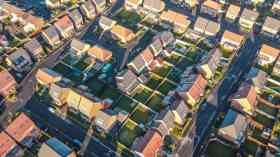Grantex is the UK’s leading supplier of specialist aggregates and producer of Premium Dried Sports Sand for High-Performance Synthetic Pitches.
Data reveals health inequalities in England

The UK Health Security Agency (UKHSA) has published new analysis of health inequalities in England.
The Health Inequalities in Health Protection report gives a high-level summary of the current state of health inequalities in England caused by infectious diseases, as well as environmental health hazards.
The report found that people living in the 20 per cent most deprived areas in England are almost twice as likely to be admitted to hospital due to infectious diseases than the least deprived.
Those living in the North-West are 30 per cent more likely to be hospitalised for an infectious disease (3,600 per 100,000 admissions for Sept 23-Aug 24), compared to the average for England (2,800 per 100,000).
The data also showed that areas of high levels of deprivation typically experience higher levels of air pollution than less deprived and less ethnically diverse areas.
It was also found that the scale of inequalities between ethnic groups varies by specific disease. For example, emergency admission rates for tuberculosis were 29 times higher for ‘Asian other ‘, 27 times higher for ‘Indian’ and 15 times higher for ‘Black African’, compared to ‘White British’.
The research estimated that inequalities in emergency infectious disease hospital admissions cost the NHS between £970 million and £1.5 billion in 2022-23.
Furthermore, people living in deprived communities experience higher emergency hospital admission rates, compared to the least deprived communities. The rates are twice as high for respiratory diseases in general and up to seven times higher specifically for tuberculosis and six times higher for measles. The rates are also twice as high for invasive infections in general, and up to 2.5 times higher specifically for sepsis.
Dr Leonora Weil, Deputy Director for Health Equity and Inclusion at UKHSA said: "The report reveals some stark facts on the state of inequalities in health security faced by some people, in particular those living in the most deprived communities and certain areas of the country, some ethnic groups, as well as excluded groups such as those experiencing homelessness.
"These health protection inequalities - where there are poorer health outcomes based on where you live, your socio-economic status or ethnicity are avoidable, pervasive, and preventable. That is why it is so important to shine a light on these findings to increase action to support communities to live longer and in better health.
"Going forward our data and analysis of the evidence will help us, and our partners apply a health equity lens to all our health security work, to inform how we better target effective health services and wider interventions to those most at need.
"This report is just the start. We need to build on these insights, as only through persistent and dedicated effort across all health organisations will we make a real difference to helping all people live longer and in better health."
Company Focus
Event Diary
Join us for the landmark 10th Anniversary of the London Build Expo, the UK’s largest and most influential construction and design show.
Retail Supply Chain & Logistics Expo returns to Excel London across 12-13 November, once again bringing together the world of logistics, supply chain, eCommerce and retail innovation for two dynamic days of opportunity.
Every sport, from grassroots football to world-class tournaments, depends on one constant: high-quality playing surfaces and well-maintained green spaces.
Supplier Profiles
Bauder Accepts Keys to its New UK Distribution Centre at Gateway 14
Bauder marked a major milestone in its UK expansion with the official handover of a brand
Words of World: Bridging language barriers with excellence
At Words of World, we specialise in professional translation and interpreting, d
Latest Features
The British Institute of Cleaning Science (BICSc) and the Cleaning & Support Services Association (CSSA) have successfully completed a groundbreaking project aimed at exploring the future of cleaning. This collaboration marks a significant milestone in the cleaning industry, reflecting a shared commitment to embracing innovation with confidence.
The Crown Commercial Service’s (CCS) new framework on Language Services (RM6302), dealing with translation, transcription and interpreting, is live, running from 7th May 2025 to 6th May 2028.















